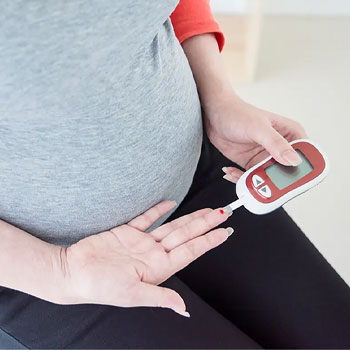diabetic pregnancy
What is Diabetic Pregnancy?
Diabetic pregnancy occurs when a woman with pre-existing diabetes becomes pregnant or when diabetes is first diagnosed during pregnancy, a condition known as gestational diabetes. Managing diabetes during pregnancy is crucial for the health of both mother and baby. In this guide, we will explain the types of diabetes that can affect pregnancy, the potential risks involved, and the essential steps for managing diabetic pregnancy.
Types of Diabetes in Pregnancy
Pre-existing Diabetes:
Type 1 Diabetes
An autoimmune condition where the body does not produce insulin. Women with type 1 diabetes need to manage their condition carefully before and during pregnancy.
Type 2 Diabetes
A condition where the body becomes resistant to insulin or doesn’t produce enough insulin. Managing blood sugar levels before conception is essential to reduce complications.
Gestational Diabetes (GDM)
This type develops during pregnancy, typically in the second or third trimester. It’s often detected through routine screening tests and usually resolves after childbirth. However, it can increase the risk of developing type 2 diabetes later in life.

Risks Associated with Diabetic Pregnancy
Uncontrolled diabetes during pregnancy can lead to several complications for both mother and baby, including:
For the mother
- Preeclampsia: A condition characterized by high blood pressure and potential organ damage.
- Preterm Birth: Early delivery can occur, leading to potential health issues for the baby.
- Hypoglycemia: Low blood sugar episodes can be dangerous and need immediate attention.
- Increased Risk of Cesarean Delivery: Due to potential complications, C-sections are more common in diabetic pregnancies.
For the Baby
- Macrosomia: Larger than average birth weight, increasing the risk of birth injuries.
- Neonatal Hypoglycemia: Low blood sugar levels in the newborn.
- Respiratory Distress Syndrome: Breathing difficulties due to premature lungs.
- Higher Risk of Obesity and Type 2 Diabetes: Later in life, children born to mothers with diabetes may have an increased risk of these conditions.
Managing Diabetic Pregnancy
Effective management of diabetes during pregnancy involves a comprehensive approach that includes medical, nutritional, and lifestyle interventions.
Preconception Care
- Medical Consultation: Women with pre-existing diabetes should consult their healthcare provider before conception to ensure optimal blood sugar control.
- Medication Adjustment: Some diabetes medications may need to be adjusted or changed to ones that are safer for pregnancy.
Monitoring Blood Sugar Levels
- Regular Testing: Frequent blood sugar monitoring helps maintain levels within the target range. This can involve using a glucometer or continuous glucose monitor (CGM).
- A1C Testing: Regular A1C tests provide an overview of blood sugar control over the past 2-3 months.
Diet and Nutrition
- Healthy Eating Plan: A balanced diet with appropriate portions of carbohydrates, proteins, and fats helps manage blood sugar levels. Working with a registered dietitian can provide personalized dietary guidance.
- Meal Timing: Regular meals and snacks can prevent blood sugar spikes and dips.
Physical Activity
- Exercise: Moderate exercise, like walking or swimming, can help control blood sugar levels. Always consult a healthcare provider before starting any new exercise regimen.
Medication Management
- Insulin Therapy: Many women with diabetes will need insulin therapy during pregnancy. It’s important to follow the prescribed dosage and schedule.
- Oral Medications: Some oral diabetes medications may be safe during pregnancy, but this should be determined by a healthcare provider.
Regular Prenatal Visits
- Frequent Check-ups: Regular visits to the obstetrician, endocrinologist, and other specialists are vital. These visits help monitor the health of both mother and baby and adjust treatment plans as needed.
- Ultrasound and Non-Stress Tests: These tests monitor the baby’s growth and well-being.
Managing a diabetic pregnancy requires diligent planning, consistent monitoring, and collaboration with healthcare professionals. With the right approach, women with diabetes can have a healthy pregnancy and a healthy baby. Always seek advice from your healthcare team to ensure the best outcomes for you and your child.
